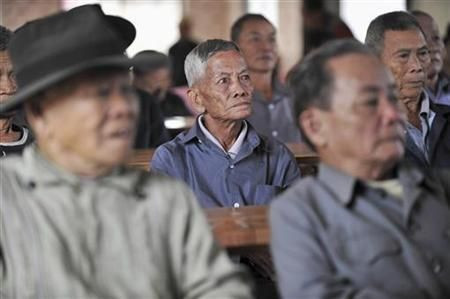Centenarians In South China's Hainan Province Reveal Secret To Longevity

The population in one Chinese county seems to have cracked the code to longevity. Despite surviving on only a few dollars a day and living in cheap shanty homes, a demographic of elderly Chinese villagers has endured several environmental and political hardships, making them one of the oldest groups of people on the Earth.
Chengmai is a grouping of several villages on the tropical southern island province of Hainan. According to the AFP, the mostly agricultural villages are home to more than 200 residents over the age of 100 out of a population of 560,000, a ratio among the highest in the world. Among the 200 centenarians at least three are known “supercentenarians”-- people who are over the age of 110, an incredible concentration considering there are fewer than 400 known supercentenarians worldwide.
Li Aizhu, who was born in 1900, according to her government-issued residence card, is one of the area’s local “longevity celebrities.” The title comes complete with a metal plaque that was issued by local government officials, her family said. Along with the plaque, which now hangs in the living room of her concrete home nestled near a farm, being a longevity celebrity entitles Li to a stipend of 500 yuan (roughly $81) every month as well as free medical care.
So, what’s in the water in Chengmai that has the people outliving their counterparts in other countries? Experts say it’s a combination of lifestyle habits promoted by the environment. “There is not a lot of industry, the climate is good, they can get exercise easily, and the diet is healthy; they have plenty of fresh fruit and vegetables, and the soil is also naturally high in selenium,” which is an essential nutrient, Jennifer Holdaway, head of the China Environment and Health Initiative of the Social Science Research Council, said after visiting Chengmai last year.
Other old-timer locals say it’s the simple life that has kept them alive for so long. Healthy lifestyles that naturally include physical activity lend well to longevity. “I’ve never done any exercise, except hard farm work,” 86-year-old Wang Kailu, who lives in a concrete shack with his wife, said. Wang and his wife live in a small and extremely basic home, using water that he draws from a well to water his small vegetable plot, which sustains the two of them.
A key ingredient to longevity, many locals are claiming, is the regular consumption of alcohol. A local grain spirit called “Three Coconut Spring” is the drink of choice for locals, including Xu Yuhe, who is 104 and told AFP that she takes daily shots of the drink. Sheng She, who at 80 doesn’t have quite as many decades under her belt, also says that drinking is part of her daily ritual, indulging in the same spirit as Xu.
A study sponsored by Chengmai’s Communist Party committee found that the lifespans of residents are a result of a combination of “diligent, simple-minded and magnanimous" lifestyle as well as "mainly taking a vegetarian diet, eating sensibly" and the classic "early to bed, early to rise.”
While all of that may be true, many locals still insist that alcohol is just as integral in the routine of a healthy life. “I drink alcohol every evening, just a little bit, it helps you feel warm,” Sheng said.
© Copyright IBTimes 2025. All rights reserved.






















